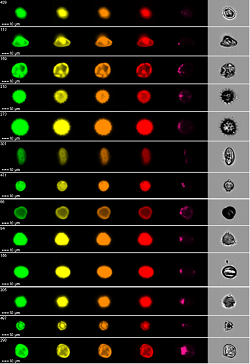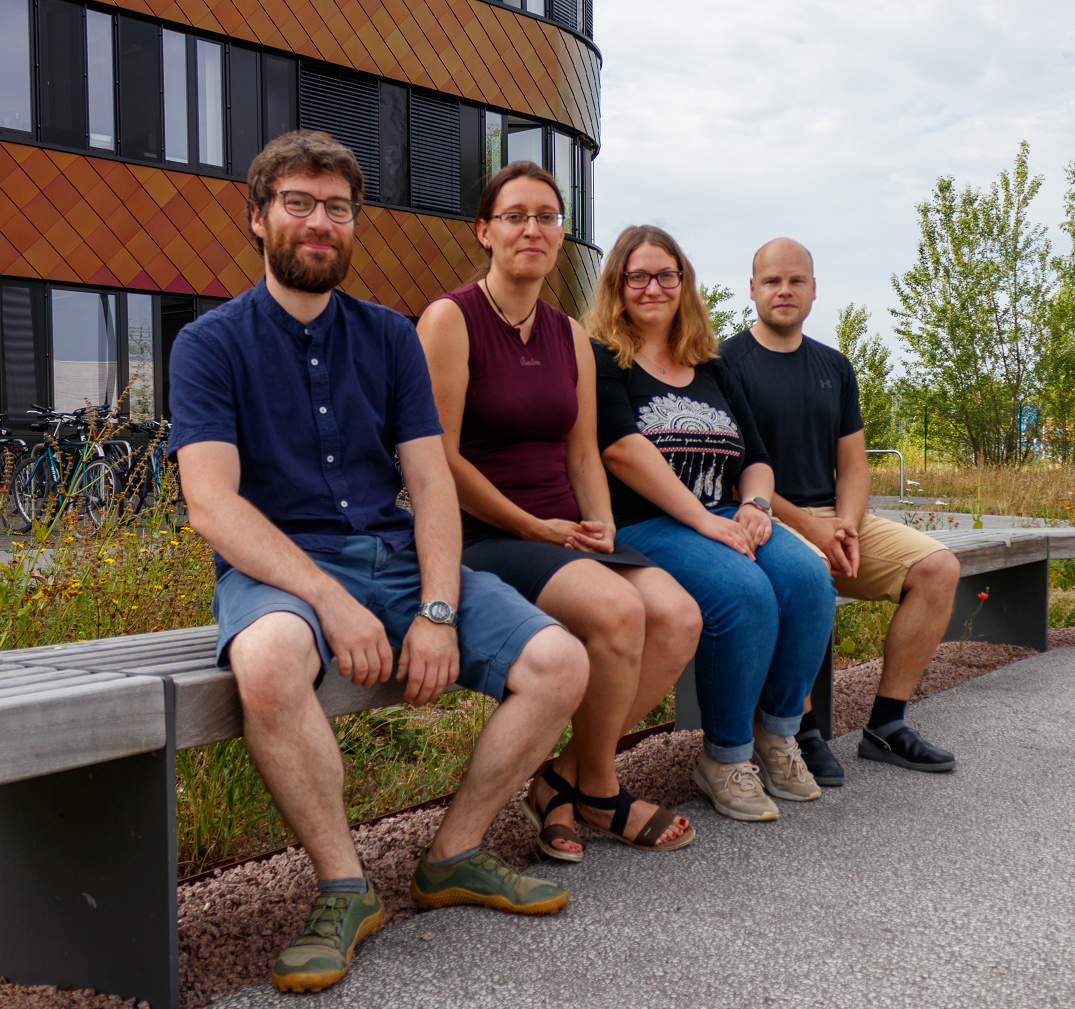Arbeitsgruppe: Bild-basierte Durchflusszytometrie
 Gute Wasser- und Luftqualität sowie Bestäubung sind von hoher Relevanz für unser tägliches Leben und stehen im Zusammenhang mit mikroskopisch kleinen Organismen oder Partikeln (zum Beispiel Phytoplanktonorganismen und Pollen). Für eine schnelle Beurteilung von Luft- und Wasserqualität, sowie Bestäubungsleistung ermöglicht eine weltweit einzigartige Konfiguration unseres bild-basierten Durchflusszytometers die Hochdurchsatz-Messung von mehreren tausend mikroskopischen Bildern in kurzer Zeit (Sekunden bis Minuten). In Kombination mit Deep Learning-Methoden entwickeln wir eine zukunftsweisende neue Technologie zur automatisierten Hochdurchsatz-Arterkennung mikroskopisch kleiner Organismen und Partikel entwickeln. Das Erreichen dieser ehrgeizigen Vision ist nur mit interdisziplinärer Arbeit und der Unterstützung vieler Kooperationspartner möglich (aufgeführt in den einzelnen Projekten).
Gute Wasser- und Luftqualität sowie Bestäubung sind von hoher Relevanz für unser tägliches Leben und stehen im Zusammenhang mit mikroskopisch kleinen Organismen oder Partikeln (zum Beispiel Phytoplanktonorganismen und Pollen). Für eine schnelle Beurteilung von Luft- und Wasserqualität, sowie Bestäubungsleistung ermöglicht eine weltweit einzigartige Konfiguration unseres bild-basierten Durchflusszytometers die Hochdurchsatz-Messung von mehreren tausend mikroskopischen Bildern in kurzer Zeit (Sekunden bis Minuten). In Kombination mit Deep Learning-Methoden entwickeln wir eine zukunftsweisende neue Technologie zur automatisierten Hochdurchsatz-Arterkennung mikroskopisch kleiner Organismen und Partikel entwickeln. Das Erreichen dieser ehrgeizigen Vision ist nur mit interdisziplinärer Arbeit und der Unterstützung vieler Kooperationspartner möglich (aufgeführt in den einzelnen Projekten).
Neben der Etablierung von automatisierter Arterkennung, nutzen wir bereits bild-basierte Durchflusszytometrie in merkmalsbasierten, physiologischen Experimenten um Koexistenz- und Resilienzmechanismen von Phytoplanktonorganismen zu untersuchen.
News
NutriBee as part of the Beenovation projects
Video-Porträt über unsere Arbeit
PlanktAI - Phytoplankton identification using AI - PIs: Dr. Jana Wäldchen, Dr. Ladislav Hrodac, Dr. Susanne Dunker
SedimentAI - Automated particle detection in Sediments using imaging flow-cytometry and Artificial Intelligence (SedimentAI). PIs: Dr. Susanne Dunker, Prof. Dr. Ulrike Herzschuh, Dr. Thomas Hornick, Dr. Kathleen Stoof-Leichsenring, Prof. Dr. Bogdan Franczyk, Prof. Dr. Patrick Mäder (funded by HelmholtzAI grant)
PhenObs - PhenObs is a global network of botanical gardens bringing together researchers, students and citizen scientists to learn more about the impacts of climate change on the phenology of herbaceous plant species (PhenObs).
HistColNet - Historical collections: a window into the impacts of decades of anthropogenic change on plant-pollinator interactions - PIs: Dr. Demetra Rakosy, Dr. Susanne Dunker, Dr. Thomas Hornick (funded by the iDiv Flexpool DFG grant)
iNutriPol - Assessing the impact of the nutritional value of pollen diversity for soil food webs - PI: Dr. Thomas Hornick, Co-PIs: Dr. Simone Cesarz, Dr. Susanne Dunker, PD Dr. Mika Tarkka, Prof. Dr. Severin Sasso, Dr. Ronny Richter (funded by the iDiv Flexpool DFG grant)
iNTERACT - impacts of laNdscape structure, floral resources and land-use intensity on the healTh of bEneficial aRthropods in AgroeCosysTems - PI: Dr. Christophe Dominik, Co-PIs: Dr. Oliver Schweiger, Dr. Tesfaye Wubet, Dr. Susanne Dunker, Prof. Dr. Robert Paxton, Prof. Dr. Severin Sasso, Dr. Panagiotis Theodorou (funded by the iDiv Flexpool DFG grant)
Nutribee - Interaktion von abiotischen Stressoren und Nahrungslimitierung auf Bienengesundheit und Entwicklung von Jungvölkern im Freiland - PI Dr. Silvio Erler, Projektpartner: Julius Kühn-Institut (JKI), Institut für Bienenkunde, Nds. Landesamt für Verbraucherschutz und Lebensmittelsicherheit, Institut für Bienenkunde und Imkerei (IBI), Ruhr-Universität Bochum, Freie Universität Berlin, Technische Universität Ilmenau, Universität Hohenheim (NutriBee funded by the BMEL/BÖLN)
iCyt - integrative Cytomics (iCyt) support unit - PI: Prof. Dr. Stan
Harpole, Co-PIs: Dr. Susanne Dunker, Prof. Dr. Severin Sasso, Dr.
Torsten Jakob, Prof. Dr. Patrick Mäder, Dr. Jan Bumberger (funded by the iDiv Flexpool DFG grant)
PolDiv - Automated high throughput pollen diversity monitoring to study the
ecosystem services air quality regulation and pollination (wind and
insect pollination) - PIs: Dr. Susanne Dunker, Prof. Dr. Stan
Harpole, Dr. Jan Bumberger, Prof. Dr. Peter Dietrich, Dr. Anett Richter,
Prof. Dr. Aletta Bonn, Prof. Dr. Regina Treudler, Prof. Dr. Tiffany
Knight, Dr. Jana Wäldchen, Prof. Dr. Patrick Mäder (PolDiv funded by the iDiv Flexpool DFG grant) -
ResBioDiv - A mechanistic test of resilience provisioning of biodiversity across environmental gradients - PIs: Prof. Dr. Stan Harpole, Prof. Dr. Antonis Chatzinotas
PhyCosms
(funded by UFZ-IP, Helmholtz Association grant):
Leiter:
Wissenschaftliche Mitarbeiter:
M. Sc. Franziska Walther
M. Sc. Peter Hofmann
Technician:
Alumni:
Ridwan Jafaar (Erasmus student): Cross-boundary nutrient and diversity effects of terrestrial plant pollen on freshwater phytoplankton productivity
Daniel Lahr (Research associate): Implementation of iCyt workflow and AI training
Sumaira Saleem (Research associate) (2023): PlanktAI project, Phytoplankton identification via AI
Sophie Löbel - Master student (2022/ 2023): Biological ice nuclei in air and rainwater samples: studies on ice nucleating potential, macromolecular composition and morphology (Co-supervision with Prof. Dr. Heike Kalesse-Los, Dr. Susan Hartmann, Dr. Silvia Henning, Dr. Thomas Hornick)
Thomas Krautwig - Master student (2022/ 2023): Influence of macromolecular composition of pollen grains on their ice nucleation potential (Co-supervision with Prof. Dr. Heike Kalesse-Los, Dr. Susan Hartmann, Dr. Silvia Henning, Dr. Thomas Hornick)
Lea Reinke - Bachelor student (2022): Biotic interactions oft he cyanobacterium Microcystis aeruginosa and the green algae Oocystis marssonii
Ella Schadt - Bachelor student (2020): Untersuchung der Interaktion von Chlamydomonas reinhardtii und Pseudomonas protegens mittels bildgebender Durchflusszytometrie (Co-supervision with Prof. Dr. Severin Sasso)
Emily Scheil - Bachelor student (2020): Estimating the total pollen production in Carpinus betulus L. at the Leipzig Canopy Crane (Co-supervision with Prof. Dr. Christian Wirth and Ronny Richter)
Nele Schildt - Bachelor student (2020): Untersuchung der Interaktion von Chlamydomonas reinhardtii und Pseudomonas protegens mittels bildgebender Durchflusszytometrie (Co-supervision with Prof. Dr. Severin Sasso)
Johanna Knechtel - Bachelor student (2017): Quantifizierung allelopathischer Wachstumseffekte in Mono- und Mischkulturen von Mikroalgen (Co-supervision with Prof. Dr. Christian Wilhelm)
 Photo credit: Stefan Bernhardt
Photo credit: Stefan Bernhardt

